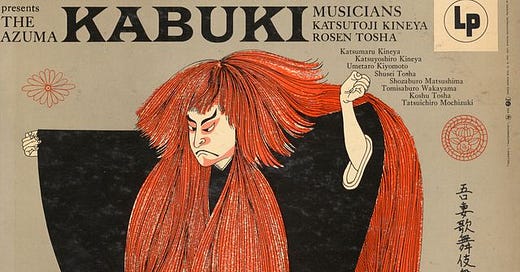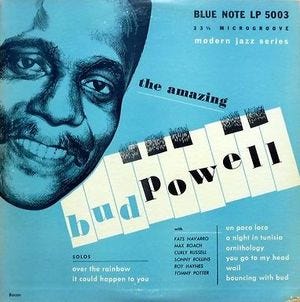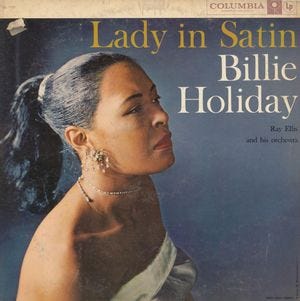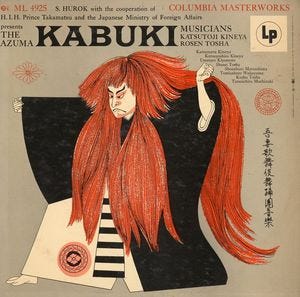Some Jazz Records: Cecil Taylor Clippings (Part 3)
Comments on recordings from musicians and other actors of the jazz scene. Random and not-so-random listening cues from the archives.
Lennie Tristano, Ju-Ju/Pastime, Jazz 101, 1952, 10" 78 rpm.
"I love Bud [Powell] and the swing of the future just must [illegible] on his—I think!," Cecil Taylor wrote in a 1952 letter to composer Robert Ceely transcribed by Allan Chase. "L. T. [Lennie Tristano] on 'Ju-Ju' as I recall the side is at his best because he is swinging in the Bud thing. But saying or rather using his own harmonic devices--[illegible] tell you about L. T. and his school, my one visit, him at all—We can’t 'Ju-Ju' and 'Pastime' in NY—is this not the lamest?" Tristano’s "school" was likely his mid-Manhattan loft, which he had also equipped with recording gear. It was where "Ju-Ju" and "Pastime" where recorded in 1951. Tristano subsequently released the two tracks on Jazz Records, his own label.
Bud Powell, The Amazing Bud Powell, Blue Note BLP 5003, 1952, 10" LP.
"There was a lot of music going on in my early years in Boston. Like I heard Bud [Powell] at this time [probably in 1951], and even though I felt that it was a spiritually different music, I couldn’t identify with it," Cecil Taylor tells A. B. Spellman in his Four Lives in the Bebop Business. "Later on I heard Bud’s recording of 'Un poco loco,' and it completely extinguished the [Lennie] Tristano influence which was strong in me in the early fifties." Powell’s "Un poco loco" first appeared on 78 and on 10" album in 1952. The album was later expanded to fit the 12" format.
Billie Holiday, Lady in Satin, Columbia CL 1157 (CS 8048), 1958, LP.
"The magnificent thing about Billie Holiday was that no matter what happened… Seeing her when I was 12 and understanding that not only was that sensuous, and that the sensuality was not separate from the way she moved and sang," Cecil Taylor told Perfect Sound Forever. "Billie was in the middle of whatever the rhythm was, and her body showed that. And then the last performance that I saw, her majesty [had switched] from a stride pianist to Mal Waldron, and her voice had changed, her physicality had changed, but the passion! […] Billie sang 'You Don’t Know What Love Is' on that album with strings, which certain erudite critics, one in particular, gave it a 'C minus,' ha ha! I’ve only worn out four copies of it." Holiday taped her strings album, Lady in Satin, in 1958, one year before her death.
The Azuma Kabuki Musicians, Nagauta Music and Original Music and Arrangements from Older Classics, Columbia Masterworks ML 4925, 1954, LP.
Discussing his listening habits in The Wire in 1990, Cecil Taylor began by giving a couple of names he did not listen to. "You know, I don’t listen to Chick Corea, for instance; I don’t listen to Keithy-poo Jarrett, I’m not particularly interested in that," the pianist told Brian Priestley. The list of names he "might listen to" began with the Azuma Kabuki, a Japanese dance troupe whose traditionalist credentials were contested but which was the first company to tour the US and Europe using the Kabuki label. The troupe made only one recording, in 1954, the year of its first visit to the US. "What I’m consciously working to develop is a concept that utilizes the voice," Taylor told Down Beat in 1986 when asked about his developing use of the voice in his work. "The Kabuki, the [Bunraku], and the [Azuma] Kabuki please me greatly and have an effect on what I’ve done in recent years." The album taped by the Azuma Kabuki Musicians can be heard in full at the Internet Archive.







